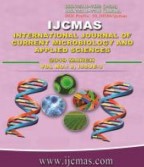


 National Academy of Agricultural Sciences (NAAS)
National Academy of Agricultural Sciences (NAAS)

|
PRINT ISSN : 2319-7692
Online ISSN : 2319-7706 Issues : 12 per year Publisher : Excellent Publishers Email : editorijcmas@gmail.com / submit@ijcmas.com Editor-in-chief: Dr.M.Prakash Index Copernicus ICV 2018: 95.39 NAAS RATING 2020: 5.38 |
There is growing global evidence that the changes in climatic conditions are exacerbating the pest problems in agroecosystems, thereby adversely affecting agricultural productivity. The recent example is serious outbreak of polyphagous species of mealybug Phenacoccus solenopsis Tinsley witnessed by cotton crop in India and Pakistan during 2005-09. This study investigates farmers’ perceptions about changes in climatic variables and incidence of mealybug in cotton. The coping and adaptation strategies of the farmers are linked to a very large extent with their perception about mealybug incidence. The study was carried out in four cotton growing districts distributed among two agro-ecological zones of Maharashtra state of India. The cross sectional research design was used for study. A multistage stratified random sampling procedure was adopted to select districts, villages and farmers. A total of 160 cotton farmers were randomly interviewed from sixteen villages. The Statistical Package for the Social Sciences (SPSS) was used in analyzing the cross sectional data. The findings revealed that there is a significant correlation between farmers’ knowledge on climate-mealybug relationship and adoption of appropriate management strategies. The information and knowledge factors like education, farming experience, localite sources and mass media are significantly affecting the perception of mealybug infestation by cotton farmers. It is also felt that there is need for development of appropriate strategies for enhancing farmers’ knowledge on climate-pest interactions. The analysis of adaptation practices and constraints at farmer level will help facilitate formulation and implementation of policies appropriate to the climate change adaptation planning.
 |
 |
 |
 |
 |